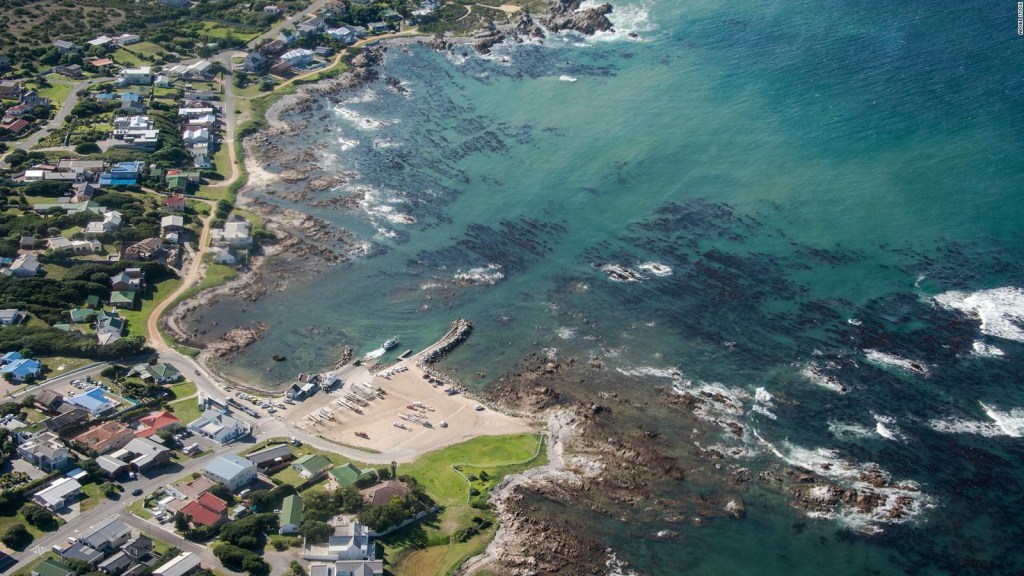Scientists find killer whales that hunt large mammals 0:43
(CNN) --
A pair of killer whales has driven great white sharks away from a stretch of South African coastline after killing five sharks over a period of just a few months in 2017, according to a new study.
White sharks used to dominate areas off the coast of Gansbaai, about 100 kilometers east of Cape Town, but in recent years sharks have avoided them, according to a paper published Wednesday in the African Journal of Marine Science.
A pair of killer whales chase white sharks off the Gansbaai coast of South Africa.
The Gansbaai coastline was once a popular spot for great white shark sightings, but they have markedly declined in recent years.
The study used long-term sighting and tagging data to show that white sharks have been driven out by orcas, sometimes known as killer whales.
Scientists film orcas for the first time hunting and killing an adult blue whale
The researchers also analyzed five great white shark carcasses found on shore, four of them with the nutrient-rich liver removed, and one with the heart also removed.
All had wounds made by the same pair of killer whales, which have likely killed more great white sharks, the researchers say.
The study followed 14 white sharks for five and a half years, finding that they fled the area when killer whales were there.
The researchers believe that the sharks' sense of fear triggers a rapid long-term mass migration when they know the predator is present.
"Initially, following an orca attack in Gansbaai, individual white sharks did not appear for weeks or months," study lead author Alison Towner, senior white shark biologist at the Dyer Island Conservation Trust, said in a news release. .
advertising
Towner believes this is "large-scale avoidance," similar to the way Serengeti wild dogs avoid certain areas when lions are present.
"The more orcas frequent these places, the longer great white sharks stay away," he added.
When anchovies mate, they churn up the ocean and stimulate a healthy ecosystem, study finds
A changing ecosystem
Before killer whales started attacking white sharks, the sharks had only been absent from Gansbaai for one week in 2007 and three weeks in 2016.
This means that the prolonged absences witnessed by the researchers are unprecedented, and it is changing the ecosystem of the area.
Coppery sharks have become the new mid-range predators in the area, Towner said.
"These coppery sharks are also being targeted by killer whales, which indicates a level of experience and skill in hunting large sharks," Towner said, adding that fur seals are now preying on African penguins, which are in danger of extinction.
"That's a downward impact, we also have 'upward' trophic pressures from the extensive removal of abalone, which roam the kelp forests that connect these species," he added.
"In short, although this is a hypothesis for now, there is a limit to the pressure an ecosystem can withstand, and the impacts of killer whale removal of sharks are likely to be much more far-reaching."
A "steep decline"
Towner also believes killer whales are becoming more prevalent off the coast of South Africa, and this particular pair could be part of an unusual group of shark-eaters.
"This change in the behavior of both top predators could be related to a decrease in prey populations, including fish and sharks, which would cause changes in their distribution pattern," he said.
Look at the 'very strange' baby ghost shark scientists discovered
Killer whales target younger sharks, he said, which could have a greater impact on vulnerable white shark populations, since great white sharks grow slowly and are slow to mature.
The researchers acknowledge that sea surface temperatures could also influence white shark sightings, but "the immediate and abrupt decline in sightings in early 2017 and the prolonged and increasing periods of absence cannot be explained."
Other explanations could include direct fishing of white sharks or declines in prey numbers due to fishing, they add, but while this may "potentially contribute to an overall decline in white shark numbers in South Africa, it is unlikely to explain the sudden localized decrease".
Another 2016 study suggested there were only a few hundred great white sharks left in South Africa, compared to previous estimates of a few thousand.
Furthermore, DNA analysis of shark tissue showed that the genetic diversity of South African whites is exceptionally low, making them more susceptible to external shocks such as disease or environmental change.
OrcaSouth AfricaWhite Sharks

